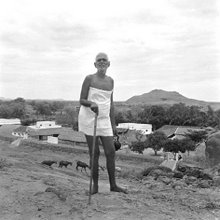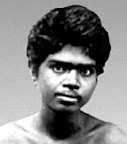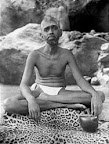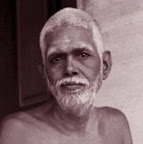"IT is nearing dusk. He is not at the playground. It seems that he did not go to the school. Nor has he returned home. Where has Venkataraman gone without informing anyone? Maybe he left for Manamadurai at being scolded for neglecting his studies. There was nothing special about the scolding beyond what was being said usually," so thought Subbu Iyer and Nagaswami and made enquiries of friends and acquaintances. They did not know what to do. At last they noticed the letter left behind by Venkataraman in Nagaswami's trunk. It was confirmed that he left for an undisclosed destination — how to search for him? They felt that they should at least inform people at Manamadurai, which they did the same day (29-8-1896) by telegram. The news came as a shock to Alagamma and her brother-in-law Nelliappa Iyer. This was a major shock for Alagamma within five years of her husband's passing away.
Several thoughts crossed their minds — could Nagaswami have scolded Venkataraman for neglecting his studies, even if it were so what was wrong with it? Could Subbu Iyer's wife have harassed him with a lot of household chores? But she was not that type at all. Did the school teacher warn him that he might not get through his examinations. Comments flew past on these lines. But was this all true? When the call of the Supreme comes,
it becomes irresistible and no worldly attachment can even come in the way. Venkataraman had no such attachment, all that he was interested in was lying in the lap of his Father. How could such a one stay at home?
The people from Manamadurai went to Madurai to join the search but to no avail. "After all, he has taken three rupees, as soon as that money is spent he is bound to come home," so they tried to console Alagamma. Days, weeks, months passed by but the boy did not return. The days of consolation also ended.
A rumour reached them that Venkataraman had joined a drama troupe at Tiruvananthapuram. Nelliappa Iyer went there to make enquiries, but it was a futile exercise. Not satisfied with his efforts, Alagamma herself went there. At a street corner she saw someone of the same physique as Venkataraman — but could not catch up with him. Unsuccessful, Alagamma returned home.
In due course, Nagaswami passed his examination and joined the Registrar's office as a clerk. His wife also joined him. And seeing her son settle down, Alagamma was to an extent satisfied and her sorrow receded into the background.
On 1 May 1898 Subbu Iyer passed away at Madurai.
Nelliappa Iyer and others went to Madurai and after the funeral ceremonies Nelliappa Iyer stayed back for a short time. One afternoon, a Tiruchuzhi youth ran into the house excitedly announcing, "Venkataraman's whereabouts are now known. He is at Tiruvannamalai and he is a famous sadhu [?] there." In utter disbelief, the family asked him, how he came to know about that. He replied: "I had been to the
Tirugnanasambandar math [?] here. One Annamalai Tambiran of a math [?] at Tiruvannamalai was describing with great devotion, a youthful sannyasi at Tiruvannamalai. He knew me because of some properties belonging to their math [?] in the vicinity of our place. He recognised me and said, `The young sannyasi belongs to your place' I, in return asked him who the sannyasi was. He said, `Tiruchuzhi Venkataraman — that is what he wrote on a piece of paper.' As soon as I heard it, I ran up to this place."
On hearing this, Nelliappa Iyer, along with Narayanaswami Iyer, a distant relative, went to Tiruvannamalai. That was the period when the Swami was staying in the mango-grove of Venkataramana Naicker, and he refused to grant permission to them to visit the Swami saying, "He is a mouni, you should not go and disturb him on any account." Nelliappa Iyer pleaded, "At least, let us have a glimpse of him," Naicker did not relent. Finally, Nelliappa Iyer begged, "I will give a note. Please show it to your Swami and allow us to go in, only if he agrees." Naicker yielded. Nelliappa Iyer wrote: "Manamadurai pleader, Nelliappa Iyer seeks an audience." The paper had the handwriting of Nagaswami on the reverse, the paper belonged to the Registrar's office. The Swami saw the note and concluded that Nagaswami was employed. He consented to see them. Nelliappa Iyer entered the grove.
It was true. He was their boy. The dust covered-body appeared repulsive. Several emotions flooded Nelliappa Iyer, he was glad at finding their boy, sad at his unkempt
appearance, happy at his being so eminent, moved at his being in such a pitiable state. As the Swami was a mouni, Nelliappa Iyer told Naicker and Palaniswami?
I am happy that a boy of our family has reached such an exalted state. But he need not expose himself to the elements in this manner — there is a huge support for him back home, he need not suffer like this. He need not forsake his path or become a householder. He can continue to be a sadhu [?] amidst his relatives, I shall arrange all facilities for that. There is the samadhi of a mahatma [?] at Manamudarai. If the Swami does not wish to stay at home he may reside there. I will take care of him and ensure that he is not at all disturbed.
All arguments were fruitless. The Swami sat motionless like a rock to such an extent that Nelliappa Iyer began to doubt whether he heard them or whether he was their boy at all! Yet the trials continued for about five or six days.
"The boy has completely changed ? he does not like our words," thought Nelliappa Iyer. Narayanaswami Iyer became angry and wanted to forcibly take away the boy. As he approached the Swami with this intention he felt a burning sensation all over his body. Then he backed out and thought enough was enough. They then decided to return home and inform Alagamma of what had happened. They gave her the comforting news that it was indeed their boy whom they met and the disconcerting news that he refused to return home.
Alagamma was not satisfied and said to Nagaswami, "Would he have returned empty-handed if the boy had been his? Would he not have forcibly brought him? Let us
go ourselves." But Nagaswami pleaded that it would not be possible for him to obtain leave from the office.
After staying at the grove for six months, the Swami felt it advisable to shift, as with frequent visitors the garden might get spoilt. Thus he moved to Arunagirinathar temple.
Arunagirinathar is reputed to be the linga consecrated by Adi Sankara. This temple is to the west of Ayyankulam tank. The Swami moved there sometime in August-September, 1898.
During his stay at the Gopura Subrahmanyalaya, which was before his moving to Gurumurtam, the Swami had to beg for food only once. That was when he declined the food offered by a pious lady who usually offered food to sadhus. He went to a house near the temple and clapped his hands. The lady of the house, Muthamma, recognised him, took him inside and served him good food. She felt that the Swami resembled her son who had just passed away. During his stay at Gurumurtam, the Swami did not have to go out to beg. Several people would bring food and offer it to him. While at the mango grove nobody was allowed to enter it and offer food. Palaniswami would beg for food either at Kilnathur or Arunachala and bring it. Possibly, the Swami now felt like begging for food himself again and wanting to be all alone asked Palaniswami to go his way. But Palaniswami returned to the Swami the same evening. Where could he go? How could he live apart from the Swami?
Within one month, the Swami moved again as the crowds were too much to bear. He went to the Arunachala temple and stayed in the Western tower. But the crowd did not leave him alone either.
To the northwest of Arunachala there is a hillock, Pavalakundru. It is a part of Arunachala and some say it is the foot of Arunachala. There is a temple of Siva, a water spring and a cave on the hill. Gautama, the rishi [?], did penance here say some. At the foot of the hill is a monastery.
The Swami lived in the temple or the cave. Whether Palaniswami was there or not, for the fun of it, he would go out into the town to beg. As he was the silent one he would simply halt at a house and clap. On the appearance of someone at the door he would show his cupped hands, receive whatever was dropped in it and pass by the street eating the food. He was not concerned at whoever watched him. Those who visited the Swami at his place would be surprised at this behaviour. Swami described the act of begging thus: "As the begging was voluntary there was no feeling of humiliation, one did not care even for the status of an emperor. It was all enjoyable."
During the Christmas vacation of 1898 Alagamma reached Arunachala, along with her son, Nagaswami. Learning that the Swami was at Pavalakundru the mother and son went there. The Swami was lying on a rock and facing the east. Notwithstanding the matted locks, elongated nails, dust-laden face or the loin cloth the mother immediately recognised her son. She broke down, coaxed and begged her son to return home. The Swami neither spoke nor moved. She entreated him in many ways, recounted to him her tribulations, and pleaded with him but the Swami did not utter a single word or yield. The following day, she visited him at which time he was
surrounded by some people. She narrated her sorry story to them. They were moved and one among them, Pachaiappa Pillai, intervened and asked the Swami to have some consideration for the mother and at least give a reply to satisfy her. He gave him a piece of paper and pencil and asked him to write out the reply at least, instead of being silent. The Swami accepted the argument and wrote thus:
The Ordainer controls the fate of souls in accordance with their past deeds — their prarabdhakarma. Whatever is destined not to happen will not happen -- try how hard you may. Whatever is destined to happen will happen, do what you may to stop it. This is certain. The best course, therefore, is for one to be silent.
— From Self Realization by B.V. Narasimha Swami
Some generations earlier, a renunciate had come seeking alms to the house of one of Sundaram Iyer's ancestors. He could not get any food and incensed at this indifference, cursed the family, "At least one member of your family will have to beg for food like me in each generation."
For three generations by then that curse (or was it a blessing?) had come true. For us, that is a blessing truly, otherwise how could we have a redeemer like Ramana Bhagavan?
Referred Resources:
Tiruchuzhi
Links to letters:
Alagamma: (Chapter 102: Mother Alagamma
prarabdha: (Chapter 116: Prarabdha (Fate)
Links to rl:
Alagamma: (Chapter 31: Alagamma
Alagamma: (Chapter 32: The Mother's Nirvana
Palaniswami: (Chapter 15: Yoga Siddhi
Ayyankulam: (Chapter 11: The Goal
1896: (Chapter 10: The Great Journey
1896: (Chapter 6: Rebirth
Tambiran: (Chapter 15: Yoga Siddhi
Gurumurtam: (Chapter 15: Yoga Siddhi
Links to sp:
Links to gems:





No comments:
Post a Comment